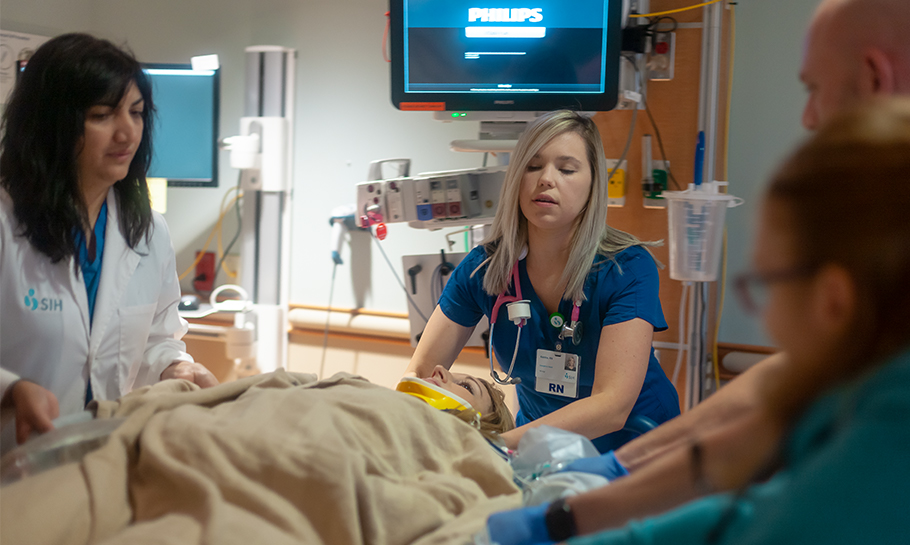Press Release

SIH Memorial Hospital of Carbondale Earns Level II Trauma Center Designation
After nearly five years of behind the scenes work, a watershed moment occurs on Monday, Nov. 4 at 7 a. M. That's when SIH memorial hospital of Carbondale goes live with level ii trauma center designation, becoming the only trauma center in Illinois south of Springfield, effectively ending the regions status as a 'trauma desert'. SIH President and CEO Rex Budde cited colossal collaboration behind the endeavor, which first appeared on the SIH strategic plan in 2015.
"Countless individuals rolled up their sleeves to cement relationships regional physicians, surgeons, staff, ground and air ambulance services and develop the required training, policy, protocol and procedures to meet the rigorous standards required by the Illinois department of public health, "said Budde. The designation ties in with the organizations desire to "keep people home".
"One of the most hopeless things you can do is follow an ambulance to st. Louis or know that a loved one has been put on a helicopter and you have to get to them," Budde said.
In recent years, nearly 800 patients initially treated in Carbondale were ultimately transferred to trauma centers in St. Louis, Missouri, and/or Evansville, Indiana.
The future excites SIH trauma program medical director Eduardo Smith-Singares, MD. The hospital treated 328 trauma patients in the months leading up to the designation (April-September 2019). "The need is well substantiated. This is a perfect place to solve a big problem for our communities. We are here," said Dr. Smith-Singares.
Dr. Smith-Singares is one of four trauma surgeons at SIH. The organization is actively recruiting a fifth trauma surgeon, orthopedic trauma surgeons, neurosurgeons and providers of various specialties. The trauma program is, in fact, a house-wide effort which also includes the emergency team, intensive care, rehabilitation and support staff, according to SIH Vice President and Administrator of SIH Memorial Hospital of Carbondale Al Taylor.
Trauma and the golden hour
A traumatic injury ranges from falls to injuries from motor vehicle crashes, blunt trauma, and penetrating wounds; or, anything that requires immediate medical attention.
Medical Director of Southern Illinois Regional EMS Joseph Haake, MD, said a trauma center plays a role in the critical golden hour, which is the time from injury to surgical intervention.
"Statistics show survivability is greatly increased if that surgical intervention is complete within the first 60 minutes," said Dr. Haake. Not from the time when someone calls 9-1-1, but from the time of the actual event itself. Even with the availability of medical air service, prior to trauma center designation, it remained difficult if not impossible to get patients to surgery within the golden hour, said SIH EMS Coordinator Brad Robinson. "It was always on the minds of medical flight and medical ground crews, emergency physicians, nurses and surgical staff. We've been treading water with weights on our ankles for years. This is an opportunity to actually take off, swim and keep our heads above water and do good things for our patients," Robinson said.
EMS: ground and air collaboration
Until now, patients with critical injuries were put on a 40-minute flight to st. Louis or a 40-minute flight to Evansville. That took up critical time in the golden hour, explained Kris Whitlock, clinical base supervisor for ARCH Air Methods in Murphysboro. We now have the ability to get patients where they need to be much faster. We provide the same level of care plus a little extra from what you see on a regular ambulance... Just at 150 mph, 2,000 feet in the air with no stoplights. Jackson County Ambulance Director Kenton Schafer said the significance of knowing patients will receive definitive care is "life-changing". "We've never had that here. I think this will be as huge to our region as the hospitals STEMI (critical cardiac care) and stroke programs. This changes the direction of all trauma in our county; there is no area too far and more than 30 minutes from Carbondale. We know exactly where we are going," Schafer said.
Dr. Haake lauds the EMS collaboration and component in the overall program. There's a military saying, the fate of the wounded lies in the hands who first deliver care... What that means is your outcome is drastically affected by the first people who respond to you, they can make the biggest difference.